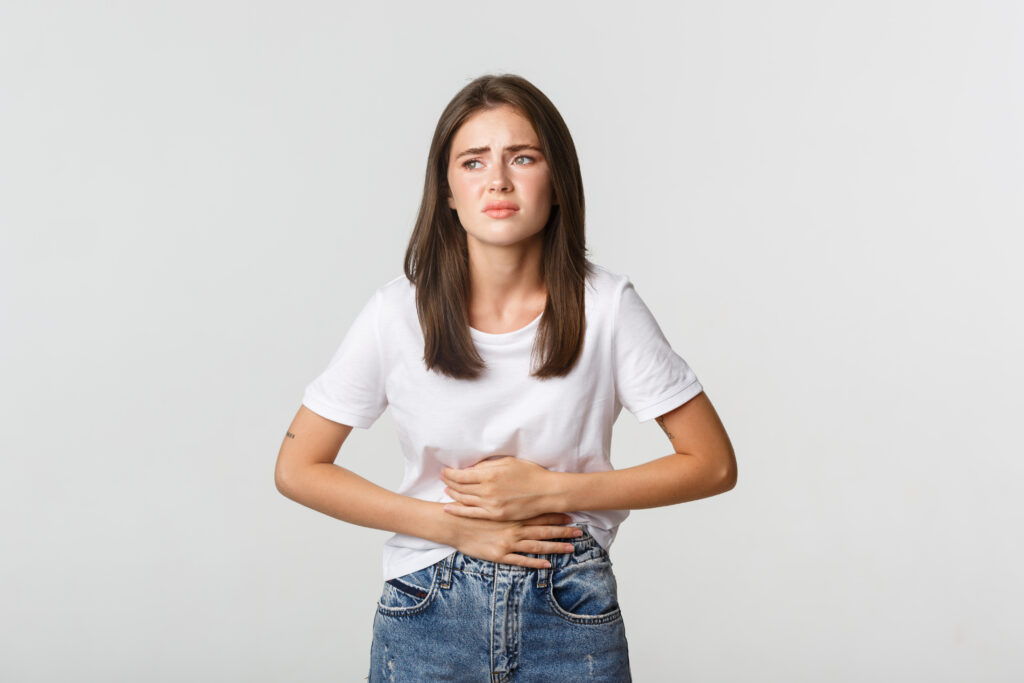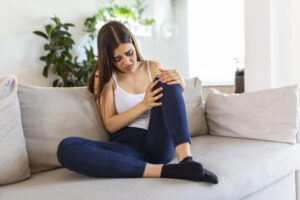Overview
Bloating is a condition where your stomach and abdomen can feel full, uncomfortable, and gaseous. It can cause your stomach to be visibly swollen, cause nausea, make you feel queasy, and, in severe cases, vomit. Bloating in women can be caused by various causes, such as pregnancy, food allergies and intolerance, bowel, and chronic diseases. Treatment can vary among individuals, depending on the underlying cause. Mild cases are treated with prescription medications and home remedies. For more severe cases, therapeutic and surgical procedures are required. Keep reading to learn more about how bloating causes nausea and fatigue in women.
Why does my stomach feel weird and nauseous?
Bloating and nausea in women are symptoms of many different diseases, such as digestive disorders, improper meals, or pregnancy. They can be acute (short-lived) or chronic. Possible causes of weird stomach feelings and nausea in women include.
- Gastroesophageal reflux disease (GERD)
- Gastroparesis
- Giardiasis
- Irritable bowel syndrome (IBS)
- Constipation and overeating
- Pregnancy
- Celiac disease
- Ileus
- Bacterial and viral infections
- Diverticulitis
- Appendicitis
- Food poisoning
- Certain medications
- Gastritis
Less common causes include
- Cancer
- Congestive heart failure
- Intestinal tumor
- Dumping syndrome
- Liver and pancreatic problems
Treatment for bloating and nausea in women
Treatment for bloating and nausea involves addressing the underlying cause. Possible treatment options include
Gastroesophageal reflux disease (GERD)
GERD occurs when stomach acid backflows (acid reflux) into the esophageal tube. Symptoms include bloating, abdominal pain, gas, nausea, and vomiting. It affects 20% of adults in the West.
Treatment for GERD includes medications to reduce acidity and provide relief for the esophagus, throat pain, and constant throat clearing. Commonly prescribed medications for GERD include proton pump inhibitors such as omeprazole and esomeprazole to block acid production, H2 blockers, and antacids to reduce and neutralize stomach acid.
Gastroparesis
Gastroparesis is a condition that affects muscular movement in the stomach and causes problems with digestion. It occurs due to nerve damage and is more common in people with diabetes.
Gastroparesis causes bloating, nausea, and abdominal pain in women. It can be treated with prescription medications such as metoclopramide and antiemetics such as ondansetron and promethazine. Over-the-counter options include pain relievers and antacids.
Giardiasis
It is an intestinal infection that causes bloating, nausea, stomach cramps, and watery diarrhea. Giardiasis parasite is found in areas with poor water quality and sanitation. It is slightly more common in men than women and has a 30% chance of spreading to others.
Irritable bowel syndrome (IBS)
IBS is a chronic condition that affects the stomach and intestines. IBS is a common cause of bloating, stomach ache, and nausea in women, with studies showing that 50% of women who see a gynecologist for lower abdominal pain have IBS.
Long-term treatment and proper management are required to treat IBS. Along with good eating habits and healthy lifestyle changes, medications and probiotics are prescribed. Your doctor may prescribe
- Anti-diarrhea medications such as Imodium
- Antibiotics such as Rifaximin for treating IBS
- Anticholinergics
- Antidepressants
- Fiber supplements and laxatives for constipation
Constipation and overeating
The most common cause of bloating, nausea, and feeling fatigue and tired in women and men is overeating. It leads to constipation, slowing down digestion, heartburn, acid reflux, and increased gas production.
Walking, light movement, and staying hydrated should help reduce constipation. Chewing gum, eating foods rich in fiber, avoiding carbonated beverages, alcohol, dairy products, smoking, and foods high in salt can help with constipation.
Pregnancy
Bloating and sickness can occur during the early stages of pregnancy due to hormonal changes. These changes slow down digestion, make you feel constipated, bloated, tired, and sometimes cause abdominal pain.
Tiredness, feelings of sickness, and bloated stomachs in women are common during pregnancy. Treatment involves warm ginger tea and vitamin B-6 supplements. While drugs and medications are generally not recommended, some anti-nausea medications, such as doxylamine, can be taken.
Food allergies and diseases
Food allergies affect 24% of women and are more prevalent in females. These food sensitivities include lactose, peanut, shellfish, dairy, and egg intolerances. Gluten intolerance, also known as celiac disease, is the inability to consume foods such as wheat and grains that contain gluten protein.
Food allergies can cause ulcers, gastrointestinal cancers, nausea, vomiting, diarrhea, cramps, and abdominal pain and trigger a severe, life-threatening allergic reaction called anaphylaxis. If you are experiencing shortness of breath, chest pain, abdominal cramps, nausea, or bloating, you should get it checked out by a doctor.
Treatment of food allergies involves antihistamines prescription medication for mild cases, and adrenaline for severe allergic reactions. It is also recommended that you avoid foods containing allergens and irritants to avoid any adverse side effects.
Ileus
Ileus occurs when the intestines cannot push food and waste out of the body. It is not the same as an obstruction or blockage where an injury, foreign object, tumor, twisted intestines, or infection blocks intestinal movement. Ileus, also known as non-mechanical bowel obstruction, symptoms include abdominal swelling (distention) and pain, gas, bad breath, diarrhea and constipation, nausea, and vomiting.
Bowel rest, intravenous fluid therapy, and nasogastric decompression are common treatments for ileus. Your doctor may prescribe metoclopramide to manage gastrointestinal problems.
Bacterial, viral, and inflammatory conditions
Various bacterial and viral infections can cause symptoms of nausea, bloating, and sickness in women. Typical symptoms include fever, diarrhea, abdominal cramps, pain, vomiting, and nausea. These infections can also lead to dehydration and electrolyte imbalance. Some common conditions include.
- Bacterial overgrowth syndrome (BOS) – abnormal increase in the growth of healthy gastrointestinal bacteria
- Viral or bacterial gastroenteritis – inflammations and infection of the digestive system
- Bacterial or ischemic colitis – reduced blood flow to a part of the large intestine
- Inflammatory bowel disease – chronic conditions like Crohn’s disease or ulcerative colitis that cause diarrhea and stomach pain
Bacterial infections are typically treated with antibiotics such as penicillins, ciprofloxacin
azithromycin, and clarithromycin. Antivirals like acyclovir and famciclovir are prescribed in case of viral infections. Additionally, IV fluids may be given to counter the electrolyte imbalance.
Dr. Claudia Gruss, a Gastroenterological Association delegate in the AMA House of Delegates and a Yale-affiliated clinical educator at Norwalk Hospital, shares.
“You should see a doctor when you have gastrointestinal symptoms that do not resolve or improve after a few days, or you have what I call the red flags such as bloody diarrhea, high fever, nausea, and vomiting, especially of bile or feculent (stool-like) material or really severe abdominal pain and weight loss.It may indicate that you may have an inflammation of the bowel and not just a common infectious gastroenteritis.”
Home remedies and lifestyle changes for relief against bloating and nausea
While proper treatment is required to cure most of these conditions, home remedies and positive lifestyle changes can temporarily relieve some symptoms. Possible treatments include
- Warm drinks such as teas (ginger and peppermint are the most effective)
- Drinking water and avoiding alcohol and coffee
- Clear soup and broth
- Juices such as apples, grapes, and cherries (avoid citrus juices)
- Avoid fried and spicy foods
- Include fiber-rich meals in your diet
- Limit late-night meals and snacks
- Know your allergies and triggers to prevent food allergies
- Eat clean and properly cooked meals
- Exercise or go for walks regularly to help with digestion
When to consult a doctor?
Bloating, nausea, and sickness can be symptoms of various diseases that may or may not require medical treatment. If you are experiencing unbearable abdominal pain, bloody stools or vomit, persistent bloating, or nausea, you should consult with a healthcare professional.
FAQs bloated stomach and feeling sick and tired female
The longer you go without pooping, the more bacteria build up in your intestines resulting in gas and bloating. Even after pooping, the bacteria can cause constipation, gas, pain, and cramps. Go for a walk and drink warm tea with peppermint or ginger to aid digestion and clear out excess intestinal bacteria.
Bloating, nausea, vomiting, gas, and sickness are common signs of pregnancy in women. However, this may only sometimes be the case. Bloating can occur due to irregular or late periods, consuming foods that slow digestion, or underlying health conditions. Pregnancy is also accompanied by other symptoms, such as sore breasts, food cravings, frequent urination, and fatigue.







